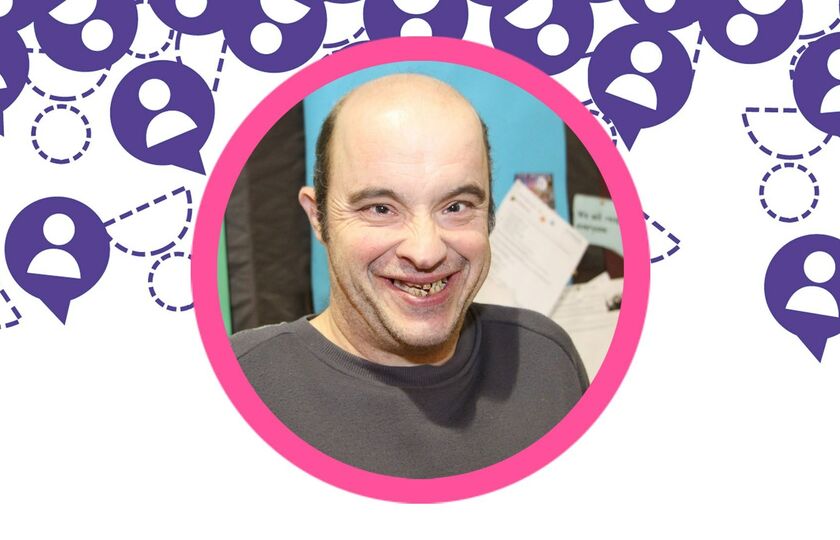Easy Read Leaflets on Sexual Health by Easy Health
Supported Loving toolkit
Contraception

Research shows there is need for clear accessible information and advice about contraception, and the need for inclusive sexual health services.
This toolkit page covers contraception and other sexual health concerns. It will discuss the need for clear, accessible information and advice about contraception, and the need for inclusive sexual health services.
This is important because some individuals do not believe that people with learning disabilities will need contraception and other sexual health services, because they will not or cannot form sexual relationships. This is not true. Sometimes people with learning disabilities are given contraception without a clear explanation of what it is for or what it does, which is not acceptable.
Research on contraceptive decision-making shows us that many people with learning disabilities feel they do not have the opportunity to make their own family planning decisions. For example, very few of the women with learning disabilities interviewed in McCarthy’s (2009) study reported making the decision to start using contraception themselves, and some encountered resistance when they asked to stop using it. Similar constraints on decision-making were also found by a team from the Open University (Earle et al., 2015). Some of the women with learning disabilities that they spoke to reported feeling coerced into accepting a form contraception, or that the choice had been made for them with little consultation or discussion. This research highlights the importance of empowering people with learning disabilities to make their own informed decisions about contraception.
How best to support people with learning disabilities with their contraception and sexual health concerns
If you are supporting someone with a learning disability that needs contraceptive or sexual health advice or treatment, they have a right to have this as long as they are aged 13 or over. Under 12-year-olds are different because of the way the law supports young children in terms of sexual activity.
- Ask the person who they would like to support them - Contraception and sexual health can be difficult or embarrassing for some people to speak about, including those with learning disabilities. It is essential that the person is comfortable with whoever is supporting them. For example, some people feel more comfortable discussing such issues with someone of the same gender. Some people can feel judged or stigmatised when they ask for help to access sexual health services, sometimes by the people who support them and sometimes by medical professionals. Scoping out services to find non-judgmental staff who will see people as sexual beings can be important.
- Access specialist advice and services - It is important that the person receives accurate and up to date advice and information. This could be done through a family planning or sexual health clinic. These clinics are run by hospitals and doctors surgeries, and they have staff who are specially trained in family planning and sexual health. This might be better than going to a GP to talk about these issues because the GP may not be an expert in them. It is also useful to check whether any local hospitals have a clinic specifically for people with learning disabilities. These clinics are the same as others, only they will have longer appointment slots and the doctors, nurses, and health advisors will be specially trained. We have listed some of these at the end. The person may want you, or someone else, to come with them to the clinic, especially for the first appointment. This is okay, as long as the clinician talks to the person and not you.
- Provide the person with accessible information - Very few of the people interviewed as part of the research described in the ‘Research Insight,’ reported being given accessible information about contraception (Earle et al., 2015; McCarthy, 2009). While some people with learning disabilities may have received some sex and relationship education at school or college, this may have been a long time ago or may not have covered the issue they need support with. Areas that people may require more information on include: how to access condoms, different contraceptive options, and their potential side effects. It is also important to provide information about other sexual health concerns such as sexually transmitted infections (STIs). The sexual health of all sexually active people with learning disabilities is important. This includes individuals who identify as LGBTQ+, as anyone who has unprotected sex is at risk of sexually transmitted infections, regardless of the gender or sex of the person they have sex with. Often clinics that are specifically for people with learning disabilities will have accessible information on contraception and sexual health. The reference section below contains links to some accessible information.
- Consider the wider context - It is important to consider why contraception is being used or requested as this may highlight other issues that need to be addressed. Contraception is often used to prevent pregnancy in individuals who are sexually active. If this is the case, consider whether the person would like any other support to maximise their safety in and enjoyment of sex and relationships. Research has also found that contraception is used to prevent pregnancy in those who do not currently report sexual activity, but ‘just in case’ (McCarthy, 2009). Similarly, there are instances where contraception is provided to prevent pregnancy in individuals who are considered to lack capacity to consent to sex and/or at risk of sexual assault or exploitation. Contraception may prevent pregnancy in these individuals, but it does not protect them against abuse, or remove the obligation to provide protection from such abuse (World Health Organisation, 2014). The necessity of contraception in these cases should therefore be questioned with family members, support staff and administering clinicians. Thorough consideration should be given to what measures are in place to support the person and manage identified risks. Contraception may also be used for reasons other than preventing pregnancy. For example, many people use contraception to manage menstruation and associated physical and psychological symptoms. Are there any further steps you could take to enhance the person’s involvement in or understanding of this process?
- Facilitate ongoing choice and empowerment - As illustrated in the ‘Research Insight,’ some people with learning disabilities continue to have little control over their contraceptive choices. Regardless of the reason why contraception is being used, efforts should always be made to support the person to make their own decisions about their contraception use. In cases where the person is considered to lack mental capacity to make the decision, they should be supported to participate as fully as possible. These are two legal requirements under the Mental Capacity Act (England and Wales) 2005. It is also important to remember that contraception is rarely a one-time decision. For example, even once a person has started a long-acting reversible contraceptive (LARC), they should be supported to regularly consider whether the contraceptive is still right for them. Choosing a type of contraception is a highly personal choice, particularly as many contraceptives have the potential for side effects. It is important that people are supported to find what works for them. This includes stopping a contraceptive if a person wishes to. You also need to consider the person’s parenting intentions and wishes. If and when the person wants to have a child is relevant to whether or not they use contraception and, if so, what type. Individuals with learning disabilities face multiple barriers to becoming and being parents, including negative assumptions about their parenting abilities and a lack of appropriate support (Working Together with Parents Network, 2014). However, people with learning disabilities can be, and do become, good parents (Working Together with Parents, 2009). See the Working Together with Parents Network for more information.
Jodie Rawles speaking abut her research as part of the Mental Health & Justice project into support in the context of people with a learning disability in relation to contraception.
Claire Lightley from Lightley Consulting explains the different methods of contraception and answers some of the most common questions about them. These videos can be used with people to help explain about different types of contraception, and help people decide what options would best suit them.
Do...
- check out specialist services in your local area
- accompany the person to any appointments they may have if they want you to
- find some accessible information about contraception/sexual health to support their visit.
Don't...
- speak for the person during appointments and don’t let clinicians ask you for information that the person can give themselves
- assume that people with learning disabilities can’t make decisions about contraception and sexual health
- ignore this important area of people’s health because it is embarrassing or difficult.
Case study one
Liam is a 35-year-old autistic man who lives at home with his family. Liam knows it is a good idea to use condoms but hates that it interrupts sex. He worries about losing an erection when going to put one on because sometimes he struggles with the packaging and getting the condom on his penis. A previous partner got annoyed with him once and he is concerned about this happening again. Liam also dislikes going to the shop to buy them. He gets overwhelmed by all the different types and feels like people are looking at him. Because of these worries, Liam often doesn’t use a condom.
Liam is aware that his penis is stinging when he goes for a wee and he has a chat with his brother, Sam about it. Sam suggests that they go to the local sexual health clinic to get it checked out and they find a clinic with walk-in appointments that day. Sam calls ahead and explains that he will be coming with Liam who has a learning disability and that he might need more time than a general appointment.
The health advisor at the clinic asks Liam some questions about his sex life, who he has sex with and whether he uses condoms. Liam asked Sam to come into the appointment with him, but the health advisor asks Liam all the questions. Sam helps a bit when he gets flustered.
When the health advisor has asked his questions, Liam sees a doctor who asks him to wee into a pot, so Liam goes into a private toilet and does that. Then the doctor takes a swab from the end of his penis. It doesn’t hurt but Liam says it felt a bit uncomfortable. The doctor explains that they will know the results in a few days, and he will be contacted by the phone numbers he has given the clinic. The doctor checks the number with Sam and asks Liam not to have sex with anyone until he knows what the results are.
Then Liam sees the health advisor again who talks to him about condoms and using condoms safely. He talks to Liam about his concerns, and he gives Liam a bag of different types of condoms he can try out. He tells him that when he has run out, he can come back to the clinic and get some more for free.
Case study two
Lucy is a 26-year-old woman with a learning disability who lives in supported living. About a year ago, the doctor recommended to Lucy that she start taking the pill. Lucy remembers that the doctor told her the pill would stop her getting pregnant, but she didn’t really understand anything else the doctor said, and things felt very rushed. Lucy doesn’t really like taking the pill. She often forgets to take it and she thinks it’s making her feel sick. But Lucy has sex with men and doesn’t want a baby right now, so tries to stick with it.
Over lunch one day, Lucy mentions to Mandy, her support worker, how much she hates taking the pill. Mandy asks Lucy if she has thought about using any other types of contraception. Lucy replies that she doesn’t know much about it and asks Mandy if she can help her find out more.
Mandy does some research to see what sexual health and learning disability services are available in the area. She also looks online to find some accessible information about different contraceptive options. As Mandy does not have any specialist training in sexual health, Mandy and Lucy arrange an appointment at a local family planning service. A few days before the appointment, Mandy and Lucy go through the accessible information that Mandy found online.
Lucy asks Mandy to come with her to the appointment, where a nurse goes through the different types of contraception, explains how they work and brings out examples. The nurse checks with Lucy what she would feel comfortable with in terms of contraception and whether she has any medical conditions that may affect which ones she can use. They decide to try an implant, which is a rod containing progesterone, that is inserted into the arm because Lucy will not have to take a pill every day. The implant lasts for three years before it needs to be changed.
Lucy makes an appointment to have the implant fitted in a few days' time and the nurse gives her some information to take home about how the implant works and what will happen at the fitting.
The nurse also talks to Lucy about condoms because it is important that Lucy still uses these with an implant to prevent STIs.
Jodie Rawles, PhD student at the Department of Psychiatry, University of Cambridge. Funded by Wellcome’s Mental Health and Justice Initiative.
Claire Lightley, Bodysense Education.
The views expressed in the Supported Loving toolkit are not necessarily those of Choice Support.
Resources
Easy Read Leaflets on Sexual Health by Easy Health
Safe sex and contraception
Safe sex and contraception – in easy words and pictures (2010) by CHANGE
Sexually transmitted infections: A guide for people with learning disabilities
Sexually transmitted infections: A guide for people with learning disabilities (2014) by the Family Planning Association
What is Chlamydia – easy ready guide
What is Chlamydia – easy ready guide from NHS Lanarkshire
Contraception Easy Read Guide - Healthy Suffolk
Read the free guide here
Healthy Suffolk - Easy read guide to STI treatment and testing
Read the guild here
Specialist Sexual Health Clinics for people with learning disabilities
Below we have listed some of the specialist services available in London and the surrounding areas. However, a quick internet search should identity any specialist services near you.
The Pearl Service - Chelsea and Westminster Hospital - Appointments can be booked by contacting the Health Advisers on 020 3315 9779. The service is based at 10 Hammersmith Broadway, W6 7AL.
Right Choice Connect Hackney- Homerton Hospital – Appointments can be booked by contacting 0208 510 5158. The Service is based at The Ivy Centre, Nuttall St, London N1 5LZ
The Bridge Service- Central and Northwest (London Hospitals – Appointments can be made by phoning or texting 07738 261323). The service is based at two sites, The Archway Centre, 681-689 Holloway Road Archway London, N19 5SE and Mortimer Market Centre, Capper Street, London, WC1E 6JB.
The Wolverton Connect Service- Kingston Hospital – Appointments can be made by phoning 020 8934 6845 and asking for a Connect appointment. The service is based at The Wolverton Centre, Galsworthy Road, Kingston, Surrey KT2 7QB






